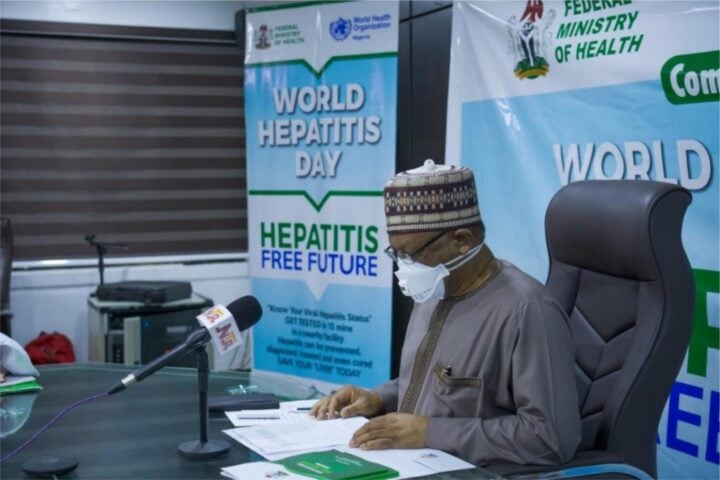Ehanire, Nigeria’s former minister of health, briefing the media on 2020 World Hepatitis Day in Abuja
Osagie Ehanire, minister of health, says over 18 million Nigerians are infected with viral hepatitis.
Ehanire said this in Abuja while addressing journalists on Wednesday in commemoration of the 2021 World Hepatitis Day.
Hepatitis is the inflammation of the liver, showing five common viral hepatitis strains as A, B, C, D, and E.
Hepatitis A and E are transmitted through contaminated food, water, poor hygiene and close contact with carriers of the virus, while Hepatitis B, C and D are transmitted through blood, sexual intercourse, bodily fluids, kissing, sharing syringes and blades and touching wounds of infected persons.
Advertisement
Ehanire said awareness, reporting, diagnosis and treatment of hepatitis B and C remained low in the country.
The minister noted that hepatitis remained a disease of public health importance, with the mortality rate from both infections still alarming despite global progress made in addressing the disease.
He said 16 million Nigerians were estimated to be infected with hepatitis B and 2.2 million with hepatitis C, which represented an estimated prevalence rates of 8.1 percent and 1.1 percent respectively.
Advertisement
“In 2019, 3.8 percent of the world’s population was living with chronic hepatitis B virus infection and 0.75 percent with hepatitis C infection,” he said.
“We adopted the national sub-theme ‘National ownership and financing for viral hepatitis elimination’ as a clarion call to action by all stakeholders and acknowledged the need to increase engagement to realise the desired changes.”
Ehanire regretted that ensuring optimal access to services remained a challenge, while out-of-pocket payment was still the main source for financing treatment.
In view of Nigeria’s commitment to the 2030 viral hepatitis elimination plan, the minister said it was essential to improve community engagement, political leadership, testing and treatment and scale up high-impact interventions.
Advertisement
He called on all Nigerians to work together to eliminate the “silent killer” by visiting a health facility for screening.
The minister described the 2021 theme as apt, while calling for continuous efforts to manage and mitigate hepatitis in Nigeria
Walter Mulombo,WHO representative to Nigeria, said the 2021 theme “Hepatitis can’t wait” emphasised the urgent need for countries to rapidly improve access to services to prevent, diagnose and treat viral hepatitis.
“In Africa, including Nigeria, hepatitis is a silent epidemic: More than 90 million people are living with hepatitis in the region, accounting for 26 percent of the global total, “Mulombo said.
Advertisement
“Around 4.5 million African children under five years are infected with chronic hepatitis B, reflecting an enormous 70 percent of the global burden in this age group.
“The global target of less than 1 percent incidence of hepatitis B in children under 5 years has been reached, but the African region is still lagging at 2.5 percent. ”
Advertisement
He noted that most of the cases could be prevented by eliminating mother-to-child transmission of the disease, during or shortly after birth and in early childhood.
“Key interventions against hepatitis B include vaccination at birth and in early childhood, screening pregnant women, and providing timely treatment,” he said.
Advertisement
Mulombo noted that Nigeria had developed policy and guidance documents to prevent and treat viral hepatitis across the five core intervention areas “vaccination, prevention of mother to child transmission (PMTCT) blood and injection safety, harm reduction and hepatitis B and C testing and treatment.
He urged all stakeholders in maternal and child health to consider integrating hepatitis B interventions into antenatal care services together with the HIV and Syphilis PMTCT programme.
Advertisement
Add a comment





